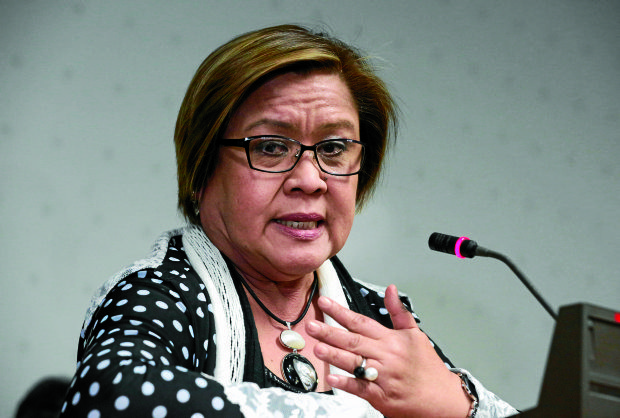State prosecutors are trying to get only one judge to try all three cases they have brought against Sen. Leila de Lima and they want that judge to be the one who ordered her arrest.
In a motion they brought on Feb. 27, they asked Judge Juanita Guerrero of the Muntinlupa City Regional Trial Court (RTC) Branch 204 to consolidate the cases handled by Branches 205 and 206, and the case in her court into a single case that she alone would try.
Last month, the Department of Justice (DOJ) filed three separate charges against De Lima in the Muntinlupa RTC, in the first step toward the prosecution of the highest-profile critic of President Duterte’s bloody war on illegal drugs.
The RTC raffled off the cases to Branches 204, 205 and 206.
But the strategy put De Lima on three fronts where she stood a chance of beating the charges that she said Mr. Duterte’s allies “manufactured” to silence her.
Without holding hearings on a motion brought by De Lima questioning her court’s jurisdiction over the case, Guerrero, with whom De Lima, as justice secretary, tussled over a drug case in 2011, ordered the senator’s arrest on Feb. 23.
De Lima surrendered on Feb. 24 and Guerrero ordered her detained at the Philippine National Police Custodial Center in Camp Crame, Quezon City.
Judges Amelia Fabros-Corpuz of Branch 205 and Patria Manalastas-de Leon of Branch 206 reset the hearings after the prosecutors asked for more time to study the motions De Lima had brought questioning the regular courts’ jurisdiction over the cases.
Series of similar offenses
In their Feb. 27 filing, the state prosecutors said the three cases should be consolidated because they “arose from a similar set of facts.”
They said there were “common parties and issues” and “interrelated evidence” that would be presented in court, as the cases were based on the same facts or were parts of a series of similar offenses.
Peter Ong, senior assistant state prosecutor at the justice department, said the cases against De Lima and her coaccused could be tried by just one court, citing a procedural rule that states consolidated cases should be assigned to the court that hears the case with the lowest docket number.
Consolidating the cases “is more practical … and [means to] avoid unnecessary costs and prevent the issuance of conflicting resolutions, orders and decisions,” the prosecutors said.
The court gave De Lima’s lawyers 10 days to comment on the prosecution’s motion.
Lorelee Granado, a lawyer for De Lima, said the defense would oppose the motion, as all the cases would be heard by Guerrero, who ordered the senator’s arrest just three days after the justice department filed the complaint against the lawmaker.
De Lima’s lawyers asked the Supreme Court on Monday to review the charges against her and to bar Guerrero from hearing the case.
They asked the high tribunal to order the inhibition of Guerrero from the case for prejudging it and for grave abuse of discretion in issuing the arrest warrant with “undue haste and inordinate interest.”
In the case in Guerrero’s court, De Lima has her former driver and lover, Ronnie Dayan, and former Bureau of Corrections chief Rafael Ragos as coaccused.
De Lima’s nephew Jose Adrian Dera is a respondent in the case handled by Corpuz.
In the case handled by De Leon, De Lima’s coaccused are Dera, former corrections bureau chief Franklin Jesus Bucayu and his alleged bagman Wilfredo Elli, her former aide Joenel Sanchez and drug convict Jaybee Sebastian.
The cases arose from complaints brought by the National Bureau of Investigation and Volunteers Against Crime and Corruption based on testimonies during the House of Representatives’ inquiry into the alleged illegal drug trade in New Bilibid Prison during De Lima’s tenure as secretary of justice.
